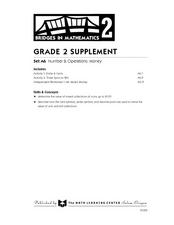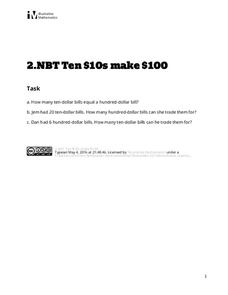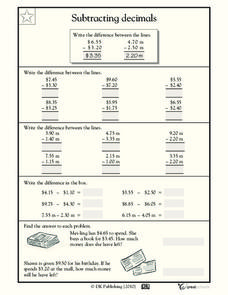Curated OER
Money
Converting money is both practical and an excellent gateway into future math concepts, and scholars get plenty of practice here! There are four sections, each with 12 values for them to convert. First, they change cent values into...
Curated OER
Estimating Differences of Money
When it comes to money math, show scholars that estimation is their best friend. They round money values to the closest dollar, 10 dollar, and 100 dollar increments, solving 19 addition and subtraction problems with approximate answers....
Math Learning Center
Grade 2 Supplement Set A6 – Number and Operations: Money
Young scholars get familiar with money during this series of engaging math activities. A game has class teams accumulating money and using symbol and number cards to display their total amount correctly on a pocket chart. All the symbol...
Illustrative Mathematics
Ten $10s Make $100
If ten $10s make $100, then how much money do twenty $10s make? Young bankers find the number of bills required to make base ten amounts in three different word problems.
Eduplace
Challenge: Find the Value
This assignment makes a lot of cents! Learners write the multiplication equation to figure out what the amount of nickels are worth and then find the value. They complete three problems and one short-answer problem. An answer key follows...
DK Publishing
Money Word Problems #1
Having money problems? How about 19 more? Scholars begin with 10 money-related word problems, some requiring they understand different coin values. They add and subtract for these, and although there are also opportunities for division...
Curated OER
Identify Coins
Kill two birds with one stone (as they say). Your class can practice problem solving skills, basic addition and subtraction, as well as work on coin values. This worksheet includes six money related word problems to solve.
Curated OER
Dollars and Cents Word Problems
Explore money math with these addition and subtraction word problems. Learners solve three scenarios, each of which is illustrated for visual learners. They use knowledge of different types of US currency to determine how much money is...
Curated OER
Equal Value
Which coins add up to these values? Young mathematicians examine five cent values, circling the coins needed to amount to them. Next, they compare money values in four sets of coins. First, learners add up each set to find the total...
Curated OER
Adding Money
Show young economists that adding money is just like adding the numbers they are used to. They complete two addition tables, adding monetary values under 50 cents. There are a couple done for them to give guidance, but learners must...
Curated OER
Money
Which coins do you need? Scholars are faced with a challenge: using only three coins they must find the exact amount needed for six items. The coins are standard US currency and are pictured at the top, however their value is not listed....
Curated OER
Counting Money
Money is always a source of interest for young mathematicians, so utilize their engagement by adding up coin values. For each set of coins (quarter, dime, nickel, and penny) scholars count up and write the total. The example has them...
Curated OER
Who Has More Money?
Coloring and money combine in this fun instructional activity! First and second graders count the amounts of money represented in each, and then color the person or animal who has the most money. They then draw the correct coins to add...
Curated OER
Working with Money
How much money do you have? Scholars add up dollars and cents to get totals for 12 visual addition problems. They look at pictures of the currency and write the total numerically (remember that dollar sign). Although the coin images look...
Elementary AMC
Earth Day Math
Take some time this Earth Day to nourish the growth of your young mathematicians with this series of task cards. Whether it's the four basic operations, place value, money, or elapsed time, these conservation-themed problems...
Curated OER
Value of Coins
In this counting money with coins worksheet, students count by ones, fives, or tens to write the amount of the money the coins in each row are worth. Students also respond to a question regarding how to make 30 cents with coins.
Curated OER
Money Math Challenge 3
In this finding the total amounts learning exercise, students add the values of pennies, nickels, and dimes to determine the total amounts of the various combinations. Students solve 6 problems.
Curated OER
Math Mammoth End of the Year Test - Grade 3
In this comprehensive diagnostic test worksheet, learners examine, study, calculate and solve 38 math problems. They work with a variety of basic math concepts and word problems.
Illustrative Mathematics
Money in the Piggy Bank
It's time to crack open that piggy bank and see what's inside. First, count up the pennies, nickels, dimes, and quarters, identifying what fraction of them are dimes. Then calculate the total value of the coins, writing another fraction...
Curriculum Corner
Fifth Grade Summer Math Booklet
A 33-page packet focuses on fifth-grade math concepts. Learners practice rounding numbers to the hundred thousands, thousands, hundreds, tens, ones, hundredths, thousandths, and hundred thousandths. They also compare whole...
Curated OER
Money
In this counting values of coins worksheet, students identify coins and their values, count the total amounts shown and write the amounts, choose the correct multiple choice answer, circle the coins that match the price, draw coins, and...
DK Publishing
Subtracting Decimals
Working with decimals or money math? Give your class some practice with subtraction and place value. After solving 18 subtraction problems with decimals and money units, fourth graders work on two word problems. A great homework...
Curated OER
Math Challenge 5
For this finding the total value of coins worksheet, students count combinations of pennies, nickels, and dimes to determine the total amounts. Students solve 6 problems.
EngageNY
End-of-Module Assessment Task: Grade 6 Math Module 3
The last installment of a 21-part module is an end-of-module assessment. Individuals show their understanding of positive and negative numbers on the number line, absolute value, and the coordinate plane in a variety of contexts.























